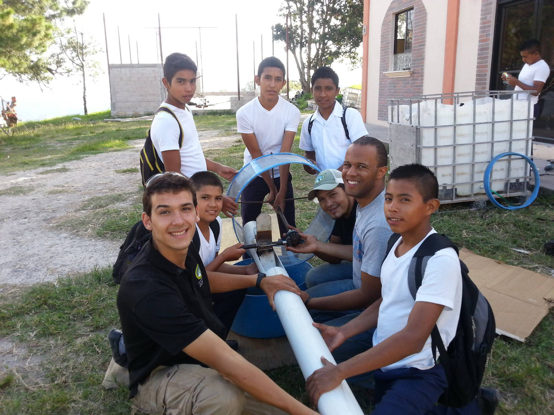Summer Archives
Josiah HollandSanta Rosa de Copan, Honduras - Mission Upreach |
Fish Farming in Honduras
For nine weeks I worked in Western Honduras at the Moses Project, which is managed by Mission UpReach (MUR) as a boarding school of sorts. 27 young leaders from communities across Western Honduras currently live at the Moses Project where they are given the resources to complete a high school education and even pursue college if they prove to seek further education. When the books and soccer balls are put away, they learn agricultural techniques through a hands-on approach from the agricultural engineer, Luis Miranda. MUR aims to empower these young leaders with the knowledge and resources that they will one day need to support their families and impoverished communities throughout Western Honduras.
Initially, I was tasked with scaling down the ongoing tilapia operations at the Moses Project into a replicable model for high intensity fish farming. I had hoped to successfully design and build a backyard model over the course of my nine weeks, but shortly after arriving, my project grew to include the designing of a commercial scale recirculating fish farming system. Therefore, I ran out of time to see my designs implemented, but I did have the chance to test the concepts behind the various filtration components needed for a recirculating system, and I also had the chance to work with Langston McElroy, a 2016 graduate from Vanderbilt’s school of Engineering, on a filtration system for the traditional tilapia ponds MUR has in operation at the Moses project. I
 In the picture to left, a handful of the young men who live at the Moses Project, Langston, Abel who is the tilapia farming operations manager, and I, had just finished assembling a hydro-powered drum filter for solids removal, which will serve as one component in the water filtration system MUR plans to use as a means of recycling the waste water from its eight traditional fish ponds that hold over 90,000 tilapia.
In the picture to left, a handful of the young men who live at the Moses Project, Langston, Abel who is the tilapia farming operations manager, and I, had just finished assembling a hydro-powered drum filter for solids removal, which will serve as one component in the water filtration system MUR plans to use as a means of recycling the waste water from its eight traditional fish ponds that hold over 90,000 tilapia.
Building the filter proved to be both challenging and exciting, but what I will not soon forget is the opportunity I had to share the importance of environmentally conscious practices with the young men from the Moses Project. We built the first prototype entirely out of recycled parts we found at the Moses Project and a junkyard in town, and our driving purpose for the filtration system was the protection of the surrounding environment. Additionally the nutrients filtered out of the water will serve as fertilizer for the beans and other crops that make the Moses Project almost entirely self-sustaining. By using locally sourced materials and purifying water that most tilapia farms in Honduras would release directly into the watershed, this filtration project with MUR not only has a very real impact on the environment and sustainability of the Moses Project, but will also hopefully transform the mindsets of the young men at the Moses Project to be more environmentally responsible.
For more, please visit Mission Upreach.
